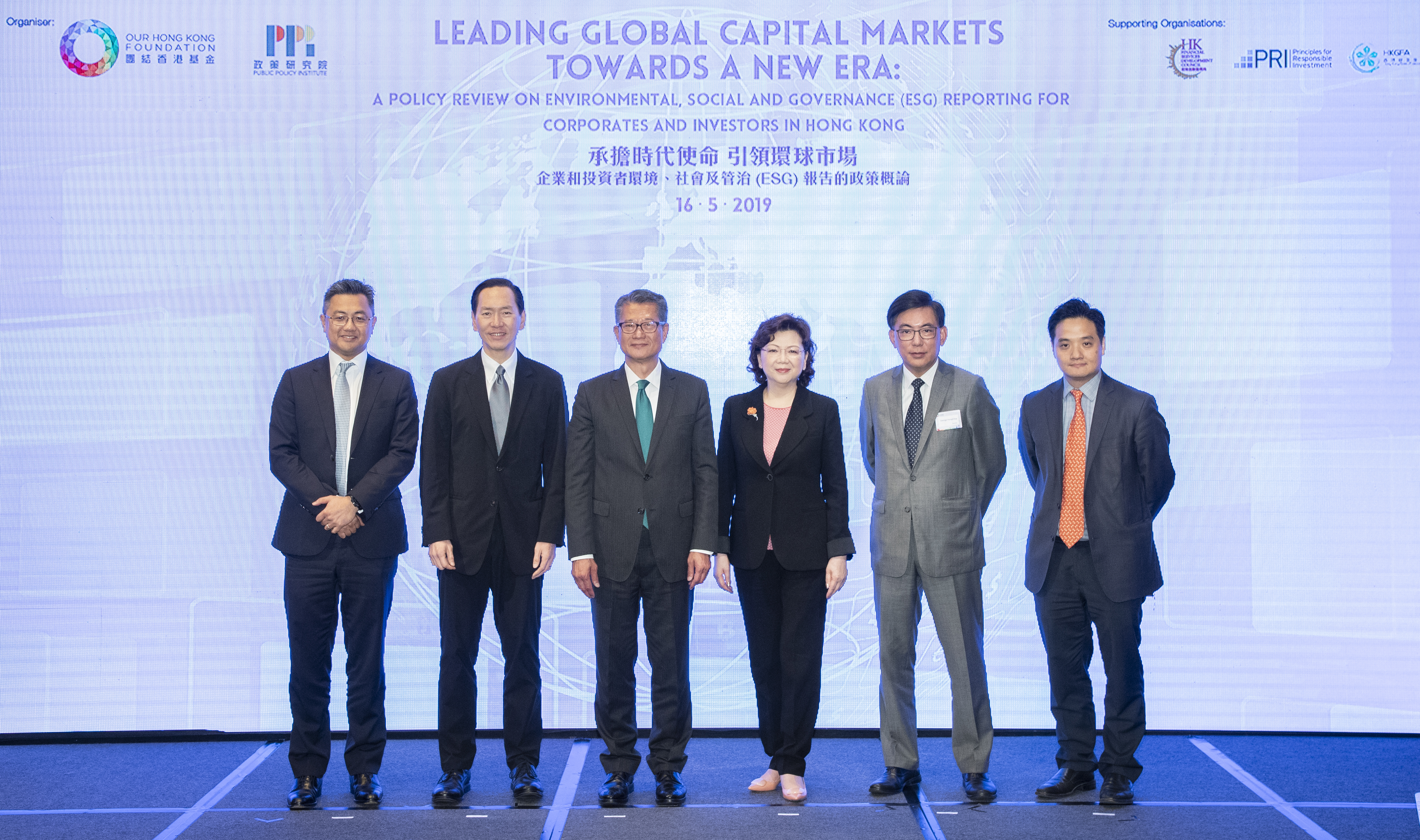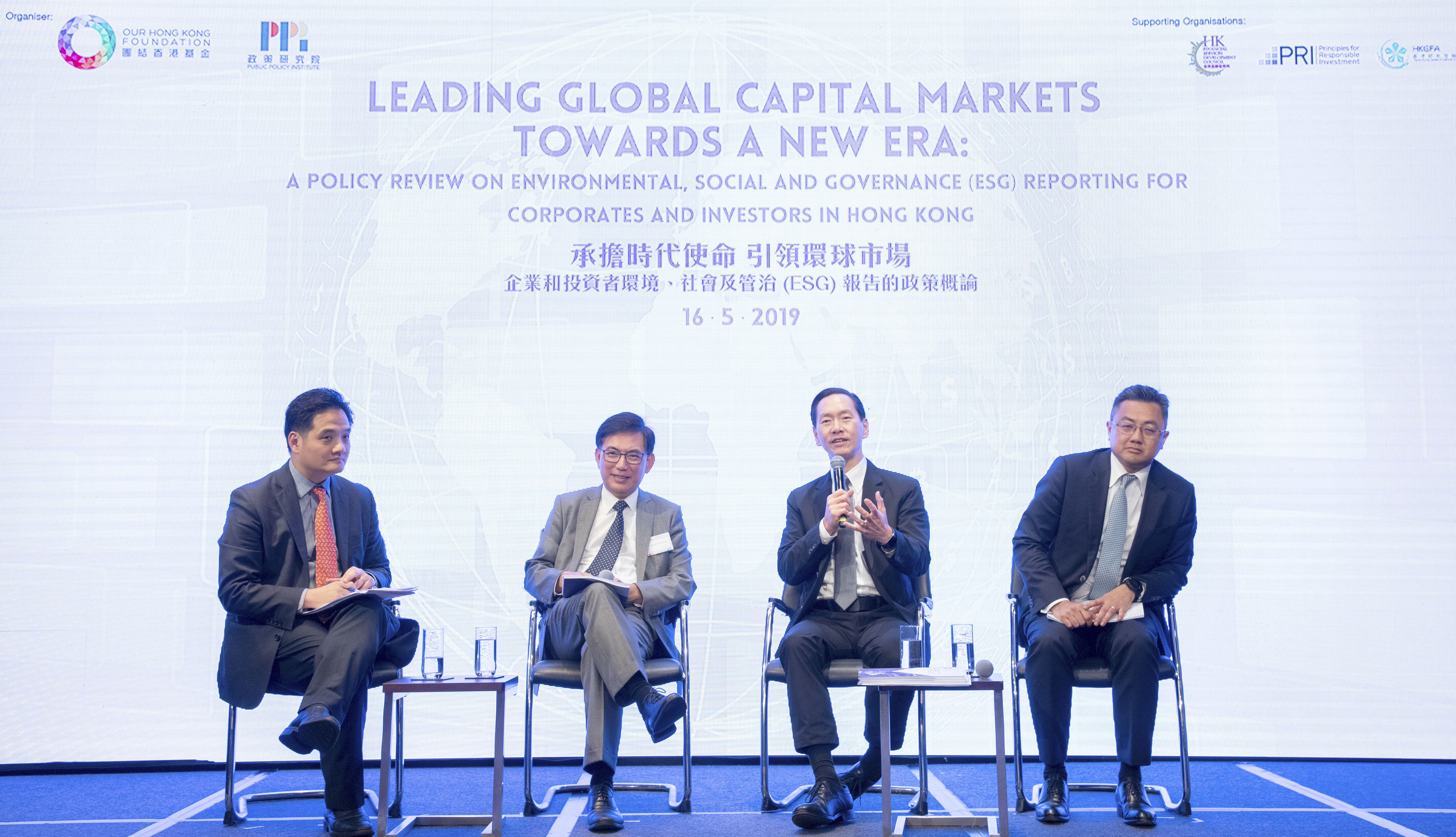Our Hong Kong Foundation Calls for an Enhanced ESG Reporting Mechanism To Promote the Development of Green Finance in Hong Kong
Our Hong Kong Foundation Calls for an Enhanced ESG Reporting Mechanism
To Promote the Development of Green Finance in Hong Kong
(16 May, 2019, Hong Kong) As the risks posed by climate change become a growing concern in the global financial market, "Environmental, Social and Governance" (ESG) investment is fast taking centre-stage. Our Hong Kong Foundation (OHKF) today released its second ESG advocacy report, proposing more specific and clearer ESG reporting guidelines in response to international trends, which ultimately facilitates the promotion of green finance and strengthens Hong Kong’s status as an international financial hub.
ESG as a Global Financial Market Trend
OHKF believes that ESG development in Hong Kong is indeed timely. As an increasing number of corporations are becoming aware of the risks posed by climate change to financial markets with concerns extending to damage of physical assets and the potential for costly compensations, the importance of ESG assessment and disclosure has been of major focus.
Hong Kong leverages on its geographical advantage in ESG development. In recent years, mainland China has been actively promoting a green economy through important levers exemplified by the inclusion of green finance into the national strategic agenda. Furthermore, in accordance with plans of the China Securities Regulatory Commission (CSRC), regulations that require listed companies to disclose environmental information will be enforced by 2020. These advancements are set to push forward the development of ESG in Hong Kong.
Further facilitating ESG development in Hong Kong is the collaborative development between central banks across the globe and the international community on the issue of green finance. To date, the Network for Greening the Financial System (NGFS) has consisted of 34 members and five observers, including the European Central Bank, the Bank of England, the People's Bank of China, the Singapore Monetary Authority and the World Bank. Furthermore, the Task Force on Climate-related Financial Disclosures (TCFD), headed by former New York City Mayor Michael Bloomberg and Bank of England Governor Mark Carney, published a report in 2017, outlining recommendations of the Task Force on the governance structures, strategies, risk management practices, metrics and targets in climate-related disclosures.
The Development of ESG in Hong Kong
The promotion of ESG development in the local financial industry has kicked off in recent years. In 2016, the Hong Kong Exchanges and Clearing Limited (HKEX) enhanced the “ESG Reporting Guide”. In 2018, the Securities and Futures Commission (SFC) published the “Strategic Framework for Green Finance” which laid out enhancing environmental reporting of listed companies as a top priority and the SFC was committed to conducting surveys on ESG investment among fund managers and asset owners. In the same year, the Mandatory Provident Fund Schemes Authority (MPFA) issued a circular letter to MPF trustees that encouraged them to take into consideration ESG-related factors during their investment decision-making process and at the same time, conveyed related investment strategies to scheme members. Encouragingly, the Hong Kong Monetary Authority (HKMA) announced last week a series of measures that support the development of green finance in Hong Kong; among them is the need to consider ESG-related factors during investment analysis.
Notably, OHKF wrote a separate ESG Strategy Report for the Financial Services Development Council in 2018. This report was built upon the previous report in 2018, including updated analysis of global trends. This report also offered recommendations on the corporate reporting system and the development of ESG in Hong Kong.
ESG Reporting Should Not Be Regarded as a “Box-Ticking” Exercise
According to the report released today, although many financial regulatory authorities have updated relevant ESG guidelines, the management level of a large number of listed companies have neglected environmental, social and governance-related risks. In addition, companies have not been making effective use of ESG reporting as a risk management tool in governance, strategy and management systems, rendering ESG reporting to simply be a “box-ticking” exercise.
For that reason, the report recommends:
- The HKEX to clearly state in the Corporate Governance Code that company boards is responsible for assessing each major environmental and social risk faced by companies;
- The HKEX should update the ESG Reporting Guide such that listed companies are required to disclose the materiality assessment process;
- The HKEX to mandatorily require listed companies to report certain important ESG indicators;
- The HKEX can also provide clear guidance to help the industry identify important ESG risks;
- The HKSAR Government should provide subsidies for companies that seek third-party assurance for these important indicators to reduce the potential burden placed upon ESG reporting.
ESG Reporting Mechanism to Be Aligned with International Standards
According to the report, while some large-scale enterprises tend to opt for a more internationally recognised ESG reporting framework, they are saddled with extra compliance costs to meet the HKEX’s ESG Reporting Guide requirements.
Therefore, the report recommends:
- The HKEX to handle flexibly to facilitate adoption of internationally recognised reporting frameworks as alternatives;
- The Government can establish a cross-sector steering committee to redevelop a clear blueprint for ESG reporting that is to be aligned with the TCFD framework.
In terms of ESG reporting regulations, the EU and the UK have adopted the principle of “comply-or-explain”, requiring fund managers to disclose ESG integration strategies. In particular, France has adopted mandatory disclosure. Certain types of pension funds in the EU and the UK are also required to mandatorily disclose their ESG integration approaches. In Hong Kong, through the SFC's Principles of Responsible Ownership (PRO), investors are only required to voluntarily engage investee companies on ESG issues. No explicit requirement for fund managers and institutional investors to disclose their ESG integration strategy is in place. This means that in Hong Kong, asset holders have no way of knowing whether fund managers have considered ESG-related risks during investment processes.
In view of this, the report recommends:
- The SFC to enhance the existing PRO to align with the United Nations-supported Principles for Responsible Investment in order to incorporate ESG factors into the investment process; furthermore, the disclosure principles should be tightened from “voluntary” to “comply-or-explain”;
- Institutions that manage large public funds, such as the Government and the HKMA, to lead by example in conducting investment based on enhanced PRO and requiring external investment managers to comply with relevant regulations;
- In terms of pensions, the MPFA to include ESG factors in its monitoring process.
The Urgency to Upgrade ESG-Related Infrastructure
The report points out that talents and datasets are the two fundamental elements of ESG reporting.
The report recommends that:
- The Government to develop environmental and social data, and open their access to enterprises as a means to reduce the cost of ESG reporting;
- Public institutions such as the Government and the HKEX should strengthen their collaboration with universities and other professional institutions to provide ESG-related training to companies;
- The Government to take lead in setting an example for the industry to formulate a clear sustainable development plan, with the aim to assist enterprises to identify local ESG risks.
"Improving the quality of ESG disclosures by companies and investors would not only strengthen Hong Kong's position as an important international financial hub but would also position Hong Kong as a model for aligning China's capital markets with international standards," said Mr Stephen Wong, Deputy Executive Director and Head of Public Policy Institute of OHKF.
“Climate change has begun to bring uncertainty to the business environment. To create long-term value for shareholders and asset owners, companies and fund managers must fully take ESG risks into consideration and disclose the relevant risks,” said Mr Alvin Cheung, Head of Social Development of OHKF.
A Policy Review on Environmental, Social and Governance (ESG) Reporting for Corporates and Investors in Hong Kong
Chinese: https://bit.ly/30kr01L
English: https://bit.ly/2Vuy8om







